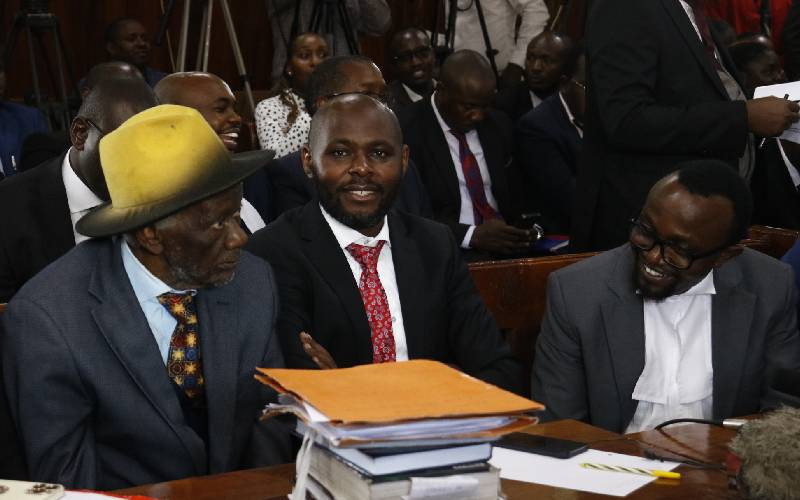The Kenya Political Crisis: Should Rigathi Gachagua’s Impeachment Be Overturned?
Kenya is facing a major political crisis after the High Court ruled that Kenya Kwanza is not the majority in Parliament, casting doubt on key decisions, including Rigathi Gachagua’s impeachment. The ruling questions the legality of major laws passed under President Ruto’s administration, with legal experts suggesting that Gachagua’s impeachment and other parliamentary actions may be unconstitutional. As the opposition weighs its options, the ruling could lead to fresh elections and a constitutional shake-up. Will the courts overturn Gachagua’s impeachment, and can Ruto’s government survive this legal storm?

Kenya is facing a political and constitutional crisis after a landmark High Court ruling declared that President William Ruto’s Kenya Kwanza coalition is not the majority in Parliament. This ruling, issued on February 5, 2025, casts doubt on the legality of key parliamentary actions, including the impeachment of former Deputy President Rigathi Gachagua on October 8, 2024, the appointment of Kithure Kindiki as Deputy President on October 25, 2024, and the passage of major laws under Ruto’s administration.
A Game-Changing Court Ruling
A three-judge bench ruled that Kenya Kwanza does not hold the majority in Parliament, contradicting National Assembly Speaker Moses Wetang’ula’s declaration in September 2022 that Kenya Kwanza was the majority coalition. The court’s decision aligns with Azimio la Umoja’s claim that it has more elected MPs than Kenya Kwanza, a finding that could have far-reaching political and legal consequences.
The ruling puts the legitimacy of key parliamentary decisions into question. It could lead to the removal of Kimani Ichung’wah as Majority Leader and raise doubts about Wetang’ula’s legitimacy as Speaker due to his continued leadership of Ford Kenya. The ruling also opens the door to possible nullification of major laws passed under the disputed majority.

Constitutional lawyer Prof. John Khaminwa argues that the ruling exposes a fundamental constitutional flaw in how Parliament has been operating. “If the House was not properly constituted, then every decision it made is open to legal challenge, including the impeachment of the Deputy President,” he says.
Was Gachagua’s Impeachment Unconstitutional?
On October 8, 2024, 281 MPs voted to impeach Deputy President Rigathi Gachagua over allegations of corruption, abuse of office, and gross misconduct. The Senate upheld the decision on October 18, 2024, leading to his removal. He was replaced by Kithure Kindiki on October 25, 2024.
However, with the High Court ruling retroactively stripping Kenya Kwanza of its majority status, legal experts argue that the impeachment process may have been unconstitutional. If Kenya Kwanza was never the rightful majority, could the impeachment be legally valid?
According to political analyst Dr. Edward Kisiang’ani, “The court ruling raises legitimate questions about whether Parliament had the legal standing to remove Gachagua. If challenged, we could see a scenario where his impeachment is overturned.”
Implications for Ruto’s Administration
With Kenya Kwanza’s parliamentary majority now invalidated, President Ruto’s flagship policies face legal challenges. The controversial Housing Levy, one of Ruto’s key economic policies, could now be declared unconstitutional. The vetting and approval process for Ruto’s Cabinet Secretaries may also be invalidated, throwing the legitimacy of his administration into question. Several laws passed under the disputed majority are now vulnerable to legal review.
Constitutional expert Dr. Linda Musumba warns of a potential government paralysis. “If Parliament was operating unconstitutionally, its decisions are now open to judicial review. We could see a wave of legal battles that may stall governance.”
What Next for Azimio?
The ruling not only weakens Ruto’s administration but also presents a political opportunity for Azimio la Umoja. However, the opposition is facing its own internal divisions. Raila Odinga is focused on his bid for African Union Commission Chairmanship, creating a leadership vacuum, while Martha Karua has exited the Azimio coalition, further weakening Azimio’s unity.
Despite these setbacks, legal experts suggest that Azimio could push for fresh elections. Political analyst Mutahi Ngunyi believes this could be a turning point. “This ruling gives the opposition leverage to challenge Ruto’s administration in court and possibly demand new elections.”
A Constitutional Crisis Looms
Some legal scholars argue that if Parliament was unconstitutional from the start, the only solution is to dissolve it and call fresh elections. But would the courts go that far?
President Ruto now faces one of the biggest political and legal challenges of his presidency. He must decide whether to fight to protect his administration’s decisions or risk a constitutional showdown in court.
With Kenya’s political future at stake, the coming weeks will be critical in determining the country’s direction. Will the courts force a reset, or will Ruto manage to hold his government together?
What's Your Reaction?















































































































